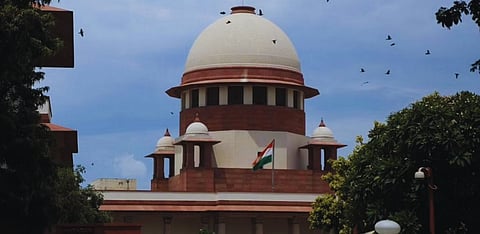

THE Supreme Court held on Thursday that a statute has to be interpreted in such a manner that its workability is preserved. The Court should not always cling to a literal interpretation, and should endeavour to avoid an unjust or absurd result. It should not permit a mockery of legislation, the court observed. "It has been held that to make sense out of an unhappily worded provision, where the purpose is apparent to the judicial eye, 'some' violence to language is also permissible", the Court added.
The Court made these remarks in a case wherein the respondent, an employee of the Kalyan Dombivali Municipal Corporation (KDMC) was arrested under the Prevention of Corruption Act, 1988 and released on bail. The KDMC subsequently suspended him and initiated a departmental inquiry against him.
The respondent challenged the inquiry before the Bombay High Court, which directed his reinstatement on the ground that he was an employee of the state government and therefore, the KDMC did not have the power to suspend him.
The High Court noted that the appointment of the respondent was made by the state government and in view of Section 36 of the Maharashtra Municipal Corporation Act, 1949 (MMC Act), it is only the state government which is competent to suspend and initiate departmental inquiry against him.
The Supreme Court concluded, after examination of the various provisions of the MMC Act, that the legislative intent is clear that the powers to be exercised by the respondent would be subject to the control of the Commissioner of the KDMC. It held that the finding of the High Court, that in view of Section 39A of the MMC Act, the Commissioner or the Corporation will not have power to suspend or initiate departmental inquiry against the AMC, is in ignorance of the provisions of Section 56 and sub-section (9) of Section 2 of the MMC Act.
Reasoning that an interpretation, which will result in anomaly or absurdity, should be avoided, the Supreme Court held that, at times, the circumstances justify a slight straining of the language of the clause so as to avoid a meaningless anomaly.
Relying on various precedents, the Supreme Court held that the High Court's conclusion would lead to an absurd and anomalous situation: The KDMC would not be in a position to initiate departmental proceedings against the respondent, even if he is found to have indulged in serious misconduct and the state government too would not be in a position to initiate action, because he is not an employee of the state government.
The Supreme Court thus observed that on a harmonious construction of sections 39A and 56 of the MMC Act, the Commissioner of the Municipal Corporation will have the power to suspend or initiate departmental proceedings against the respondent.